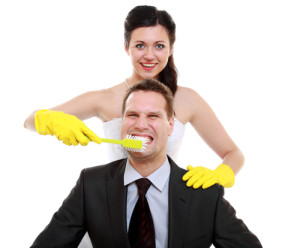 When it comes to oral hygiene, is it possible to have too much of a good thing? It depends, says Astoria, NY general dentist Dr. Jeffrey Leibowitz. Generally speaking, brushing your teeth is always a good idea. After all, it protects you from the damaging effects of tooth decay and periodontal disease. The key to ensuring optimal oral health is understanding how best to brush, how often, and when.
When it comes to oral hygiene, is it possible to have too much of a good thing? It depends, says Astoria, NY general dentist Dr. Jeffrey Leibowitz. Generally speaking, brushing your teeth is always a good idea. After all, it protects you from the damaging effects of tooth decay and periodontal disease. The key to ensuring optimal oral health is understanding how best to brush, how often, and when.
DO Be Thorough, but Not Too Aggressive
Nobody enjoys the thought of sticky plaque and bacteria accumulating in their mouth, which leads many to brush their teeth using more force than is necessary. This gradually wears down the tooth enamel, making your teeth more sensitive to heat and cold, and increasing your risk for cavities. Brushing twice daily is generally sufficient. Instead of concentrating your efforts on a single area, spend an equal amount of time brushing each section—upper left and right, lower left and right—on both the front and back surfaces of your teeth.
DON’T Brush Immediately After Consuming an Acidic Substance
Each time you eat or drink an acidic substance, your tooth enamel is almost immediately subjected to the damaging effects of acid. This causes a temporary weakening of the enamel that can be exacerbated by the act of brushing your teeth. Before you brush your teeth, it’s best to wait approximately 30 minutes.
DO Counter the Effects of Acid
Brushing immediately may be out of the question, but there are other steps you can take to protect your teeth. Drinking a glass of milk neutralizes acids and fortifies tooth enamel by replenishing calcium and minerals. If you prefer, rinse your mouth with water. You can also chew sugar-free gum to ward off unpleasant breath from your meal.
DON’T Use an Old Toothbrush
According to the American Dental Association, you should purchase a new toothbrush every three months, or earlier if the bristles show signs of wear. Bristles that are flattened or frayed cannot remove as much food and bacteria, making you more susceptible to plaque and tartar formation. Brushing with an old toothbrush could result in discomfort and bleeding gums. Dr. Leibowitz adds that parents should carefully inspect their child’s toothbrush frequently, as children tend to brush their teeth more aggressively. It may be necessary to replace their toothbrush after as little as two months.
DO Choose Soft Bristles
Unless otherwise directed, look for a toothbrush that has soft bristles. Harder bristles can easily damage tooth enamel, making your teeth more likely to stain, develop cracks, and become infected.
Has it been more than 6 months since your last dental checkup? To learn more about preventive dental care, or to schedule an appointment with Dr. Jeffrey Leibowitz, contact us at 718-728-8320. Dr. Leibowitz, a native of Queens and graduate of SUNY Buffalo School of Dental Medicine, offers general, cosmetic, and restorative dentistry to residents of Astoria, upstate New York, NYC, and New Jersey.


